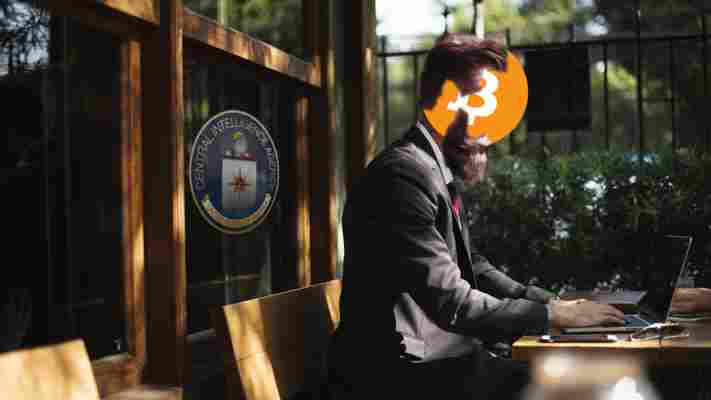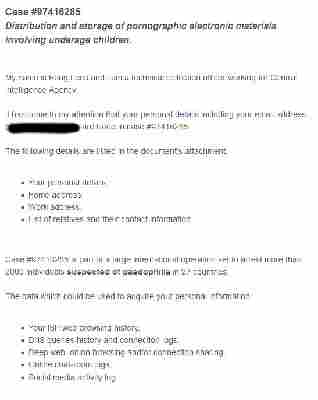A cryptocurrency fan has issued a warning: scammers are posing as the US Central Intelligence Agency (CIA) to fool you into giving up $10,000 worth of Bitcoin, so take notice.

A Reddit post titled “CIA got me fam” displayed proof of a new bogus email campaign designed to trick potential victims into thinking they are subject of an international criminal investigation.
The ruse is their details have been flagged in a database related to a police operation set to arrest more than 2,000 individuals suspected of paedophilia across 27 countries.
Legitimacy is supposedly derived from its masked email domain (@esxoia-gov.ga), as well as an image of a CIA crest in the email signature.


This potentially very serious legal problem can all go away, though, if you would just transfer $10,000 in Bitcoin to an address (supposedly) controlled Hong Lees, a federal agent working for the CIA‘s Directorate of Science and Technology.
The email lists cryptocurrency exchanges Coinbase, Bitstamp, and Coinmama as examples of platforms that support Bitcoin purchase and transferal.
It also seeks to make it clear that Lees needs “a few days” to access and edit the files (read: scrub the evidence of your supposed paedophilia), so any potential payments would be need to be made well before arrests start (the commencement date is conveniently included).
If it wasn’t already obvious, this email is full of shit. The CIA is not out here requesting Bitcoins from potential paedophiles, and if you receive this – the best course of action is to simply not respond.
This scam is a slight evolution of the infamous Bitcoin ‘sextortion’ scam . That fraud is premised on the idea that a “magic pixel” has been smuggled onto the target’s machine, which then recorded video of the potential victim masturbating.
Those masturbation vids wouldn’t be released as long as $1,900 in Bitcoin was sent to a specific address, which is considerably less than the $10,000 requested by “the CIA.”
The sextortion scam was first discovered in June 2017, and by December last year researches estimated it had successfully swindled more than $300,000 worth of Bitcoin from victims.
For now, it doesn’t appear as though this CIA scam has found any success. At pixel time, the supplied Bitcoin address is entirely empty, with no transactions in its history. Let’s hope it stays that way.
Update 17:40 UTC, March 19: As further reports surface, it appears these fraudsters are generating unique Bitcoin addresses , presumably to hide the full extent of their potential success.
As each potential victim has their own Bitcoin address to send the $10,000 “ransom,” gauging how many often their phishing results in Bitcoin payments is more difficult than if they were to use a single address for every email.
It also seems each attempt comes with a randomized name for the fake CIA agent, so if you receive this email, it’s likely it won’t be from “Hong Lees.”
The Bahamas is issuing cryptocurrency regulations to fight fraudulent ICOs
Regulators from all over the world have been waking up to cryptocurrency regulation this year and it seems the Bahamas are the latest to open their eyes.

The Central Bank of the Bahamas (CBOB) has published a regulatory framework in preparations to integrate cryptocurrency-based assets into its financial services industry, according to the Nassau Guardian .
The framework seeks to address many of the regulatory challenges the CBOC currently associates with the use of cryptocurrencies such as tax evasion, market volatility, fraudulent initial coin offerings (ICOs), and anti-money laundering policies.
The CBOB believe the cryptocurrency industry’s approach to international regulation is too fragmented – making it difficult to “manage emerging risks in the fintech arena.”
As such, the CBOB is looking to implement a number of amendments to regulations recommended by the likes of the international monetary fund (IMF).
These amendments will require any business operating in, or from the Bahamas, to “demonstrate safe and sound business practices; show that they have systems in place to measure, monitor, and adequately control market and other risks; and ensure that they have in place auditable policies, practices and procedures to prevent the use of their services for criminal purposes.”
Anti-money laundering policies will also be compulsory.
Incidentally, this news comes in the same week that Thai authorities announced they would be regulating ICOs through a dedicated portal designed to improve security, reduce fraud, and help facilitate due diligence.
$1.2M seized from Bitcoin Ponzi stuck in frozen Indian bank account
Authorities in India have found themselves in a crypto-conundrum: they can’t access cryptocurrency seized from a Ponzi scheme because such transfers have been prohibited, reports Times of India .

To make matters worse, police had hired the now-defunct cryptocurrency exchange Koinex to convert Rs 8.42 crore ($1.19 million) of the seized Bitcoin into local currency — but the company’s banking partner froze its account as a result.
A series of requests have reportedly been filed with the country’s supreme court to resolve the matter.
Specifically, a police petition challenges a Reserve Bank of India (RBI) circular that bars financial institutions from handling virtual currency. A Koinex request demands the RBI force its banking partner to unfreeze its account.
Perhaps the most curious aspect of the situation is that the RBI has reportedly now denied locking Koinex’ account while claiming it hadn’t directed the firm’s bank to do so, either.
These denials come despite confirmation from a cyberpolice senior inspector that the seized funds were unable to be accessed due to a frozen bank account.
So, while India’s lawmakers have repeatedly taken steps to ban cryptocurrency under the guise of protecting citizens from poor investments, it’s likely this sticky situation is deliciously ironic to Bitcoin fans — and rightly so.











